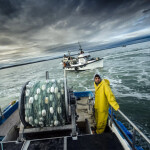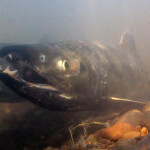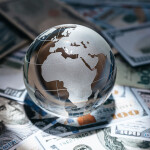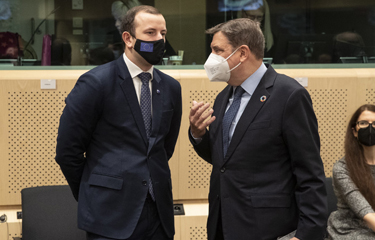A EUR 6.1 billion (USD 7.4 billion) budget of the next European Maritime, Fisheries, and Aquaculture Fund (EMFAF) for 2021 to 2027 is drawing criticism from NGOs and a WTO delegate, who say it represents a harmful subsidy encouraging unsustainable fishing.
The package was agreed to in principle last week in Brussels by the European Union’s parliament, and the European Council, composed of member-state governments.
In an interview with SeafoodSource, the delegate, who represents a non-E.U. state but who wished to remain anonymous, described the package as equating to a harmful, capacity-building subsidy. This was, said the delegate, “unhelpful” at a time when the WTO is seeking to persuade other large fishing nations like China to stop paying out harmful subsidies to their own fleets. Negotiations, which failed to produce a deal in line with the WTO’s deadline of the end of the year, but will continue in 2021.
In announcing the package European Union Environment, Oceans, and Fisheries Commissioner Virginijus Sinkevičius said the EMFAF is intended to improve conditions onboard fishing vessels and that no E.U. subsidy would “risk harmful effects.”
“The E.U. Commission is satisfied that the agreement does not include harmful fisheries subsidies, which could lead to fleet overcapacity and overfishing, in particular subsidies for the construction of fishing vessels and increase of engine power,” Sinkevičius’ spokesperson Vivian Loonela told SeafoodSource. “Even if the outcome is not as ambitious as the commission’s initial proposal, it is in line with [United Nations’] Sustainable Development Goal 14.6 and consistent with the [E.U.]’s position at the World Trade Organization.”
Seas at Risk, an NGO critical of E.U. fisheries policy said, disagreed, saying the new package “runs counter to the green promises of the E.U. Green Deal and the Biodiversity Strategy,” Seas at Risk Fisheries Policy Officer Andrea Ripol said.
“The negotiated budget represents a dramatic step backwards and a missed the opportunity to earmark funds for ocean conservation,” Ripol said. “At a time when the Word Trade Organization is negotiating a global end to harmful subsidies, the E.U. reintroduces such subsidies that will inevitably increase pressure on fish stocks and marine ecosystems.”
Much of the criticism of the new EMFAF has centered on a new measure that allows the increase of the gross tonnage of fishing vessels. The European Commission had also been at odds with some member-states who wanted more funds to go into supports for young fishermen.
Supports included in the final package include subsidies for “fleet measures” like engine replacement, acquisition of a secondhand vessel by a young fisher, and compensation for permanent cessation of fishing activities. These are “overall the same as under the 2014-2020 period,” according to Loonela. She stressed that cash for the fleet measures will be capped at 15 percent of the overall EMFAF budget “to make sure that most of financial resources are allocated to the core priorities of the EMFAF, such as sustainable fishing, innovation, collective organization of the sector, local development, as well as international ocean governance and the implementation of the new control regulation.”
But tension has risen among the E.U.’s decision-makers regarding the EMFAF package.
“In the course of the negotiations, the commission clearly and strongly opposed all amendments by the co-legislators [E.U. member-state governments] leading to harmful subsidies and developed 11 principles to frame fisheries subsidies with the necessary safeguards to prevent any harmful effects, including indirect effects,” Loonela said. “The commission welcomes the efforts from the co-legislators to adjust their positions on the basis of those safeguards. The agreement is overall in line with these eleven principles.”
In a statement, while criticizing certain elements of the deal, European Union fishing industry representative body Europêche backed the new EMFAF proposal overall.
“The sector appreciates the efforts made by the European Parliament … to fight for a fund that enables the E.U. fleet to fish better, not to fish more, fully in line with WTO’s mandate to end harmful subsidies,” it said.
But Seas at Risk called on the E.U. to reject the proposal, arguing more must be done to ensure marine conservation is given greater priority.
“This agreement will only further undermine the health of the E.U. seas, which is why we call on the European Parliament to vote it down, the Council to reject it, or the European Commission to withdraw its proposal,” it said.
Loonela said any linkage of the EMFAF to harmful subsidization of the E.U.'s fleet is factually incorrect.
“There are sufficient safeguards to avoid an increase of the ability to catch and to make sure that the increase of volume is only linked to the improvement of safety, working conditions, and energy efficiency, and to nothing else,” she said. “Therefore, this measure is not a harmful subsidy and will not contribute to overfishing or overcapacity.”
Photo courtesy of the Office of the European Union Commissionr of the Environment, Oceans, and Fisheries







